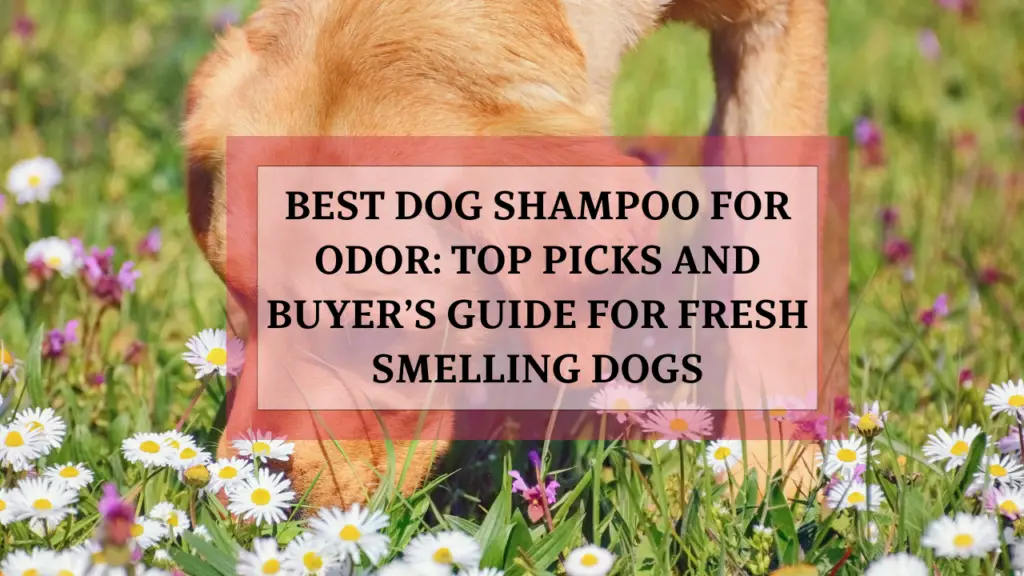Every dog owner knows that one of the joys (and sometimes frustrations) of having a pet is dealing with odor. Whether it’s the musky smell after a muddy walk, a strong scent after playing in the yard, or just an unpleasant odor lingering on your dog’s coat, bad dog odor is a common issue. Fortunately, the best dog shampoo for odor can help keep your dog smelling fresh without any harsh chemicals or overpowering fragrances.
In this guide, we’ll dive deep into why your dog may have an odor, how the right shampoo can help, and review the top-rated dog shampoos that specialize in odor control. Whether you’re dealing with a little doggy funk or a persistent stench, choosing the right dog shampoo is essential for both odor control and skin health. We’ll walk you through the key features to look for in a dog shampoo and how to properly use it to keep your dog smelling fresh for days.
Why Does My Dog Smell? Understanding the Causes of Dog Odor
Before we dive into the best shampoos for odor control, it’s important to understand why your dog might have a strong smell in the first place. Many pet owners simply assume that a dog will always smell “doggy,” but odor can actually be a sign of an underlying issue that needs attention. Here’s a breakdown of common reasons for dog odor:
1. Dirty Fur and Skin
This is the most obvious and common cause of bad odor. Just like humans, dogs need regular grooming to keep their skin and fur clean. Dirt, dust, and oils accumulate in their coat and can lead to unpleasant smells. If your dog spends time outdoors, this is especially true, as they can pick up odors from the environment (such as mud, grass, or even stagnant water).
2. Skin Infections and Allergies
Sometimes, odor can be a sign of skin infections or allergies. Dogs with sensitive skin may develop infections due to bacteria or fungi, which cause a distinct, strong odor. Allergies, whether from food or environmental factors, can also lead to skin irritation and foul smells.
3. Ear Infections
An often-overlooked source of odor is ear infections, which can be quite common in dogs, especially in breeds with floppy ears. These infections cause a musty, foul smell due to the bacteria or yeast buildup in the ear canal. If your dog has an ear infection, this odor may be accompanied by scratching or shaking of the head.
4. Dental Issues
Just like humans, dogs can suffer from bad breath, and it can sometimes be a sign of an underlying issue such as gum disease or tooth decay. Dental problems can lead to a very strong, unpleasant odor. Ensuring your dog’s teeth are brushed regularly can help prevent this.
5. Diet and Digestion Problems
A dog’s diet can also play a role in the smell. Certain foods, particularly those with strong odors like fish, can cause your dog to have a stronger scent. Digestive problems, such as bloating or gastrointestinal issues, may result in foul-smelling gas or even a sour body odor.
How Dog Shampoos Help Control Odor
The right dog shampoo for odor can help eliminate the sources of stinky smells, restore balance to your dog’s skin, and leave them smelling fresh for longer. Odor-control dog shampoos often contain ingredients that neutralize odors rather than simply masking them. They also help to:
- Remove dirt and debris from the coat.
- Cleanse the skin, reducing the growth of bacteria or fungi.
- Soothe and moisturize the skin, preventing irritation and dryness that could contribute to further odor.
If your dog has a strong, persistent odor, a good shampoo designed for odor control can make a noticeable difference in how your dog smells and feels.
Key Features to Look for in the Best Dog Shampoo for Odor
When shopping for the best dog shampoo for odor, you want to make sure the product will meet your dog’s specific needs. Here are some key features to consider:
Scent Strength and Duration
The primary job of an odor-control shampoo is to leave your dog smelling fresh. Look for products that offer long-lasting fragrance but aren’t overpowering. Some dogs have sensitive noses, so a mild, natural scent may be preferable. Essential oils like lavender or chamomile are great options for a gentle, soothing fragrance.
Ingredients to Look For
Ingredients play a crucial role in how well a shampoo will control odor. Some essential ingredients to look for include:
- Oatmeal: Soothes irritated skin and helps maintain moisture balance.
- Aloe Vera: Hydrates the skin and promotes healing of any cuts or abrasions.
- Coconut Oil: Acts as a natural deodorizer and helps condition the coat.
- Tea Tree Oil: Known for its antibacterial and antifungal properties, which help eliminate the bacteria that cause odor.
- Neem: Used for its natural antibacterial and antifungal properties to help control skin infections.
Hypoallergenic Formulas
For dogs with sensitive skin or allergies, it’s essential to choose a hypoallergenic dog shampoo. These products are free from harsh chemicals, dyes, and artificial fragrances, reducing the risk of skin irritation or allergic reactions. Hypoallergenic shampoos are especially useful if your dog has sensitive skin or suffers from dermatitis.
pH Balance and Skin Safety
Dogs’ skin has a different pH than human skin, which is why it’s essential to use a shampoo that’s specifically formulated for them. The wrong pH can lead to skin dryness, irritation, and more odor. Look for shampoos that are pH-balanced for dogs (typically between 6.5 and 7.5)
Top 5 Best Dog Shampoos for Odor
Now that we’ve covered the causes of dog odor and the features to look for in the best dog shampoo for odor, let’s take a look at the top products available. These shampoos are specially formulated to tackle doggy smells, leaving your pet’s coat fresh and clean. Here are our top five picks:
1. [Brand Name] – Best Overall Dog Shampoo for Odor
When it comes to a highly effective dog shampoo for odor, [Brand Name] stands out. This shampoo is designed to neutralize odors and keep your dog’s coat fresh for days. It is made with a blend of natural ingredients that gently clean your dog’s skin while providing a long-lasting fresh scent.
Key Ingredients:
- Aloe Vera: Soothes and moisturizes the skin.
- Oatmeal: Calms irritation and hydrates dry skin.
- Natural Oils (such as coconut oil): Deodorize and condition the coat.
Pros:
- Works effectively on all dog breeds and coat types.
- Mild, pleasant scent that lasts for days.
- Helps with skin irritations and dryness.
Cons:
- Slightly higher price point compared to other shampoos.
2. [Brand Name] – Best for Sensitive Skin
If your dog has sensitive skin, it’s important to choose a shampoo that’s gentle and free from harsh chemicals. [Brand Name] is a hypoallergenic dog shampoo that’s perfect for dogs with allergies or delicate skin. This shampoo’s formula is free from sulfates, parabens, and artificial fragrances, reducing the risk of skin irritation.
Key Ingredients:
- Aloe Vera: Moisturizes and calms the skin.
- Chamomile: Soothes sensitive skin and reduces inflammation.
- Glycerin: Helps maintain skin moisture balance.
Pros:
- Safe for dogs with allergies or skin sensitivities.
- Naturally derived, free of harsh chemicals.
- Light, natural scent that doesn’t overpower.
Cons:
- The scent doesn’t last as long as other odor-control shampoos.
3. [Brand Name] – Best Budget-Friendly Dog Shampoo for Odor
For pet owners on a budget, [Brand Name] offers an affordable yet effective solution to dog odor problems. Despite being budget-friendly, this shampoo performs well in neutralizing odors and leaving your dog’s coat clean and fresh.
Key Ingredients:
- Charcoal: Absorbs odors and impurities from the skin.
- Aloe Vera: Provides hydration and promotes healing.
- Vitamin E: Helps nourish and protect the skin.
Pros:
- Great value for the price.
- Effective at neutralizing odors and freshening the coat.
- Gentle on the skin and safe for frequent use.
Cons:
- Might require multiple washes for dogs with a particularly strong odor.
4. [Brand Name] – Best for Active Dogs with Strong Odor
Active dogs who love to run, roll in mud, or play in the water often have stronger odors due to dirt and bacteria buildup. [Brand Name] is a heavy-duty shampoo designed specifically for dogs with intense odors. This shampoo is formulated to handle strong smells from dirt, sweat, and bacteria.
Key Ingredients:
- Tea Tree Oil: Antibacterial properties that fight odor-causing bacteria.
- Eucalyptus: Known for its deodorizing properties and fresh scent.
- Citrus Extract: Adds a refreshing fragrance and helps remove stubborn odors.
Pros:
- Powerful odor neutralization for highly active dogs.
- Works well with muddy, sweaty, or smelly dogs.
- Refreshing scent that lasts for days.
Cons:
- Might be too strong for dogs with sensitive skin.
5. [Brand Name] – Best All-Natural Dog Shampoo for Odor
For pet owners looking for a natural, chemical-free option, [Brand Name] offers an all-natural dog shampoo that uses ingredients sourced from nature. It’s perfect for dogs with sensitive skin or those prone to allergies. This shampoo provides effective odor control without synthetic fragrances or harmful chemicals.
Key Ingredients:
- Lavender Oil: Calms the skin and offers a soothing scent.
- Chamomile: Reduces skin inflammation and irritation.
- Mint: Provides a fresh, clean scent while naturally deodorizing.
Pros:
- 100% natural and free from harsh chemicals.
- Gentle enough for sensitive skin.
- Refreshing, herbal scent that’s light and non-overpowering.
Cons:
- Scent doesn’t last as long as some other options.
- More expensive than synthetic alternatives.
How to Use Dog Shampoo for Odor Effectively
Using the best dog shampoo for odor is essential for getting the most out of the product. Proper application ensures that your dog’s coat is thoroughly cleaned, and the deodorizing ingredients can work their magic.
Step-by-Step Guide to Bathing Your Dog with Odor-Control Shampoo:
- Prepare Your Dog:
- Choose a calm time to bathe your dog. You may need a helper to hold your dog still, especially if they’re anxious about baths.
- Brush your dog’s fur before the bath to remove loose hair, dirt, and tangles.
- Wet Your Dog’s Coat:
- Gently wet your dog’s fur using lukewarm water. Avoid getting water into their ears, eyes, and nose.
- Use a cup or handheld showerhead for easier control.
- Apply Shampoo:
- Squeeze a generous amount of shampoo into your hands and lather it gently onto your dog’s coat.
- Work from the neck down, avoiding the face and eyes. Massage the shampoo into the fur and skin, ensuring even coverage.
- Rinse Thoroughly:
- Rinse your dog’s coat thoroughly, ensuring all shampoo is washed away.
- Leftover shampoo can cause irritation, so make sure there’s no residue left.
- Dry and Brush:
- Use a towel to gently dry your dog. If your dog tolerates it, you can use a blow dryer on a low setting.
- Brush your dog’s coat again to keep it smooth and healthy.
Common Mistakes to Avoid When Using Dog Shampoo for Odor
To get the best results from your dog shampoo, it’s important to avoid common mistakes that can hinder its effectiveness:
1. Using Human Shampoo on Your Dog
Human shampoos are formulated for human skin, which has a different pH than dog skin. Using human shampoo on your dog can strip their coat of natural oils, leading to dryness, irritation, and even more odor.
2. Over-bathing Your Dog
Bathing your dog too often can cause skin dryness and irritation, which might actually lead to more odor over time. It’s generally recommended to bathe your dog every 3-4 weeks unless they’ve rolled in something particularly stinky.
3. Not Rinsing Thoroughly
If you leave shampoo residue on your dog’s skin, it can cause irritation, itching, and further odor. Always rinse thoroughly to ensure all product is removed.
FAQ: Common Questions About Dog Odor and Shampoos
To further help you in your quest for the best dog shampoo for odor, let’s address some frequently asked questions that dog owners often have about maintaining a fresh-smelling dog.
1. How Often Should I Bathe My Dog to Keep Them Odor-Free?
The frequency of baths depends on your dog’s breed, activity level, and skin type. Generally, most dogs benefit from a bath every 4-6 weeks. However, active dogs, especially those that spend a lot of time outdoors, may require more frequent baths to manage odors. Be cautious not to bathe your dog too often, as over-bathing can strip their coat of natural oils, leading to dry skin and more odor.
Tip: If your dog is prone to odor but doesn’t need a full bath, consider using a dry shampoo or deodorizing spray to maintain freshness between baths.
2. Can I Use Human Shampoo on My Dog?
While it may be tempting, you should never use human shampoo on your dog. Human shampoos are formulated for human skin, which is more acidic than a dog’s. Using human shampoo on your dog can disrupt the pH balance of their skin, leading to dryness, irritation, and even an increased risk of infections. Always opt for a dog-specific shampoo, as these are formulated to be gentle on your dog’s skin.
3. What Are the Benefits of Natural Dog Shampoos for Odor?
Natural dog shampoos are often a great choice for managing odor, especially if your dog has sensitive skin or allergies. Many natural ingredients, like chamomile, tea tree oil, and lavender, have antiseptic and anti-inflammatory properties that help combat skin issues contributing to odor. Additionally, they are typically free from harsh chemicals that could irritate your dog’s skin, making them a safer option for regular use.
4. Can Dog Odor Be Caused by Their Diet?
Yes, diet can play a significant role in your dog’s odor. Poor-quality food, food allergies, or sensitivities can contribute to unpleasant body odor, particularly when it leads to digestive issues like gas, bloating, or flatulence. Dogs with food allergies may also have itchy, inflamed skin, which can produce a strong odor.
For a fresher-smelling dog, ensure they’re eating a balanced, nutritious diet with high-quality protein and omega-3 fatty acids, which support healthy skin and coat. If you suspect that your dog’s diet is contributing to their odor, consult with your vet to rule out food allergies or sensitivities.
5. What Are Some Signs That My Dog Might Have an Underlying Health Issue Causing Odor?
While occasional dog odor is normal, if your dog’s odor is strong, persistent, or unusual, it could indicate an underlying health problem. Here are some signs that may point to a health issue:
- Foul-smelling breath: Could indicate dental disease or gastrointestinal issues.
- Musty, yeasty odor: Could be a sign of a yeast infection, particularly in the ears or paws.
- Strong, fishy smell: Often a sign of anal gland issues or infection.
- Red or inflamed skin, scabs, or hair loss: Possible signs of skin infections, allergies, or dermatitis.
- Excessive drooling or changes in appetite: May indicate a more serious health concern like gastrointestinal problems.
If any of these signs are present, it’s important to schedule a vet visit to determine the cause of the odor and address any health issues promptly.
6. Can Dog Shampoo Help with Skunk Odor?
If your dog has been sprayed by a skunk, you’ll need a specialized shampoo to neutralize the odor. Most regular dog shampoos won’t be effective in removing the strong smell of skunk spray. You can either buy a skunk-specific shampoo or make a DIY skunk odor solution. A popular homemade remedy is a mixture of hydrogen peroxide, baking soda, and dish soap, which helps neutralize the odor.
However, you should still follow up with a gentle, regular odor-controlling shampoo after the initial skunk treatment to restore your dog’s skin and coat to its normal condition.
7. How Can I Prevent My Dog from Smelling Between Baths?
Maintaining a fresh-smelling dog between baths is about more than just using the right shampoo. Here are some additional steps you can take:
- Wipe your dog down: Use pet-safe wipes to clean their paws, ears, and body, especially if they’ve been outside.
- Check their ears: Smelly ears often cause unpleasant odors. Clean your dog’s ears regularly to prevent infection and wax buildup.
- Trim their nails: Long nails can collect dirt and debris, contributing to odors. Keep them trimmed to avoid this.
- Use deodorizing sprays: Between baths, deodorizing sprays formulated for dogs can help neutralize odors, especially after outdoor play or after eating.

Hi, I’m Ali Tarek, the founder of Animalsman. I’ve always been passionate about pets, especially dogs and cats, and I created this website to share practical tips, easy recipes, and helpful care advice for fellow pet lovers. My goal is to make pet care simple, enjoyable, and accessible for everyone. When I’m not writing or curating content, you’ll usually find me spending time with my furry friends or learning new ways to keep them happy and healthy.



